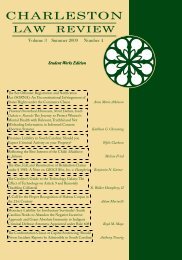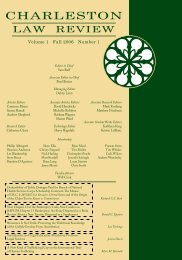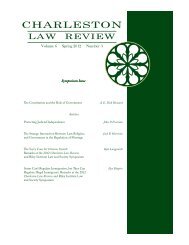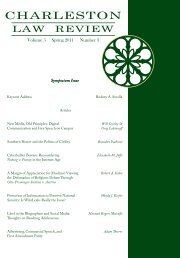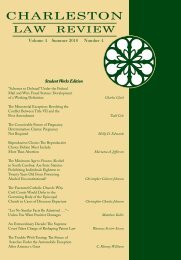Volume 5 Winter 2011 Number 2 - Charleston Law Review
Volume 5 Winter 2011 Number 2 - Charleston Law Review
Volume 5 Winter 2011 Number 2 - Charleston Law Review
You also want an ePaper? Increase the reach of your titles
YUMPU automatically turns print PDFs into web optimized ePapers that Google loves.
SCHULZE FINAL.doc1/20/<strong>2011</strong> 6:14PMCHARLESTON LAW REVIEW [<strong>Volume</strong> 5Once academic counseling is initiated, it still can take manydifferent forms. One format is driven by the philosophy that thegoal of academic support should be to help students understandhow to teach themselves to learn more efficiently. This sort ofacademic counseling often focuses on meta-cognition—thinkingabout thinking, 38 focusing students on their preferred learningstyle, 39 and creating “self-learners”—students able to teachthemselves. 40 This approach plays into the notion of autonomywith the competition for the “best” outlines because all students have access tothe methodology of outlining. This, in turn, then humanizes the law school. SeeBarbara Glesner Fines, Fundamental Principles and Challenges of HumanizingLegal Education, 47 WASHBURN L.J. 313, 316 (2008) (“Legal education cannottruly be humanized while so many faculty members are wedded to aneducational philosophy grounded in a competitive ethos.”); Michael HunterSchwartz, Humanizing Legal Education: An Introduction to a SymposiumWhose Time Came, 47 WASHBURN L.J. 235, 235–36 (2008) [hereinafterSchwartz, Humanizing Legal Education] (“[L]aw schools should demonstraterespect for students, provide a supportive environment, encouragecollaboration, produce graduates who ‘nurture quality of life,’ ‘support studentautonomy,’ provide increased practice and feedback, meet the needs of allstudents by varying teaching methodologies, teach ‘self-reflection and lifelonglearning skills’ and ‘self-directed learning skills,’ and produce graduates whodemonstrate self-efficacy.”).Individualized academic support, by contrast, focuses on a student’sparticular strengths and weaknesses, thus necessitating an initial discussionwith the student aimed at discerning where academic support measures can betargeted. As a matter of resource conservation, many programs must choose tomake individual counseling available only to students with a demonstrateddeficiency, such as underperformance on mid-year exams. See Mencer, supra.But see Todd, supra note 1, at 192 (“Focusing solely on those students at thebottom of the law school class, unfortunately, has a tendency to marginalizethem.”). Otherwise, if academic counseling was available to all students, thoseat the top of the class, who are always hungry for any source of an edge, mightmonopolize the time of the academic support faculty at the expense of the moreevasive students at the bottom of the class who are more in need of suchcounseling.38. “Metacognition is a learner’s awareness of the learning process itself.”Jacquelyn H. Slotkin, An Institutional Commitment to Minorities and Diversity:The Evolution of a <strong>Law</strong> School Academic Support Program, 12 T.M. COOLEY L.REV. 559, 569 (1995); see Robin A. Boyle, Employing Active-Learning Techniquesand Metacognition in <strong>Law</strong> School: Shifting Energy from Professor to Student, 81U. DET. MERCY L. REV. 1, 2 (2003) (encouraging law professors to vary theirteaching styles to encompass active learning).39. See Robin A. Boyle & Rita Dunn, Teaching <strong>Law</strong> Students ThroughIndividual Learning Styles, 62 ALB.L.REV. 213, 245–46 (1998).40. See Paula Lustbader, Construction Sites, Building Types, and Bridging282



